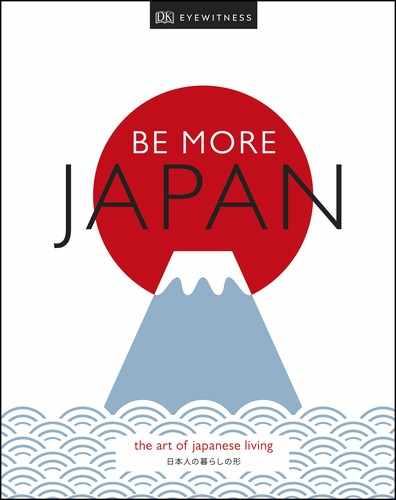日本人の哲学
JAPANESE PHILOSOPHIES TO LIVE BY
Finding inner contentment
While most Japanese people would hesitate to identify themselves as religious, the influence of ancient spiritual beliefs winds through many aspects of modern society and the way the Japanese view the world around them. The idea that objects are ingrained with a spirit is a core tenet of Shinto, and this manifests in all kinds of common rituals. The introduction of Buddhism brought such concepts as life’s transience, mindfulness, and the positive state of mu (nothingness): a void filled with meaning and possibilities. Confucianism arrived in Japan around the 6th century and centered on the teachings of the Chinese philosopher Confucius, and while the religion itself gradually disappeared after World War II, some of the concepts it emphasized are still key elements of Japanese culture: loyalty, duty, and consideration of others in the pursuit of harmony. This group dynamic is also inherent in the Japanese concept of wa, which prioritizes solidarity of community over individual interests.
The legacy of these beliefs is ever present throughout life in Japan: from the importance of team spirit in school to the mindfulness of ikebana and the tea ceremony. It’s also why a Japanese person today can find great satisfaction in a job well done—as their success isn’t purely personal but helps the whole group— or why they can be awestruck by the beauty of spring cherry blossoms, appreciating the bittersweet fleetingness of this perfect moment.

D Mindfulness and an appreciation of nature are central to Japanese philosophy.
cherish the moment
This awareness of life’s transience perhaps inspired the proverb ichi-go ichi-e, which means “one time, one meeting.” The idea urges us to treasure any encounter with a stranger or friend as a once-in-a-lifetime opportunity. Be mindful of how each gathering with friends and family is unique, and how meeting people you’ll never see again is a special moment in time when your paths have been destined to cross. To really get the feel for ichi-go ichi-e in Japan, join in a tea ceremony, where each experience is valued as one that can never be replicated.

D Spending time with friends should be cherished as a moment that will never be repeated.
Finding Happiness
In modern society, it’s easy to get wrapped up in the daily routine of commuting, working, and household chores. This is one reason why the Japanese concept of ikigai has become more important than ever. Your ikigai is the reason you get up in the morning; intensely personal, it’s about doing what you love and what you’re good at, whether it’s work or a hobby. Finding your ikigai gives you inspiration and confidence and purpose, so take some time to figure it out. It may even help you to live longer—ikigai could be a contributing factor to Japan’s famous long- living communities, as continuing to get |out and enjoy their ikigai helps the older generations stay happy and active.
de-stress
For a step toward inner peace, try shinrin-yoku (forest bathing)—just find a green space and unlock your senses.

D Escaping the urban sprawl with forest bathing is a great way to rejuvenate.
